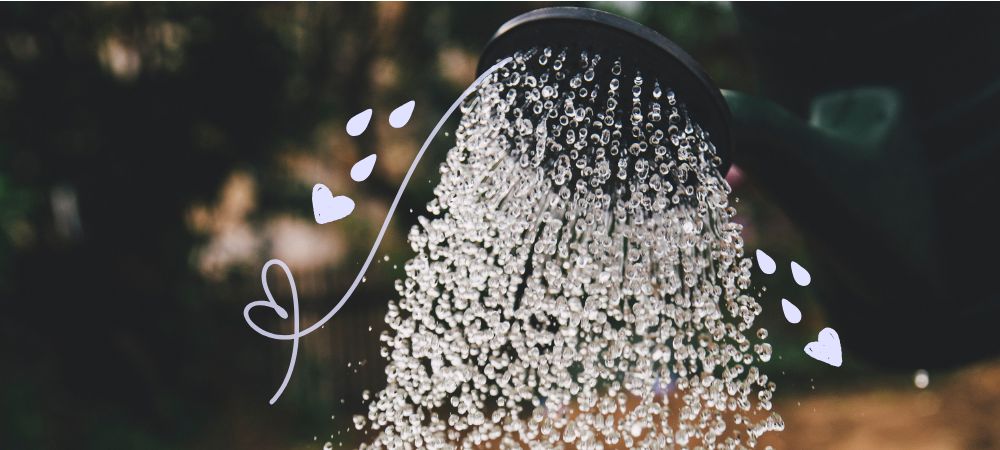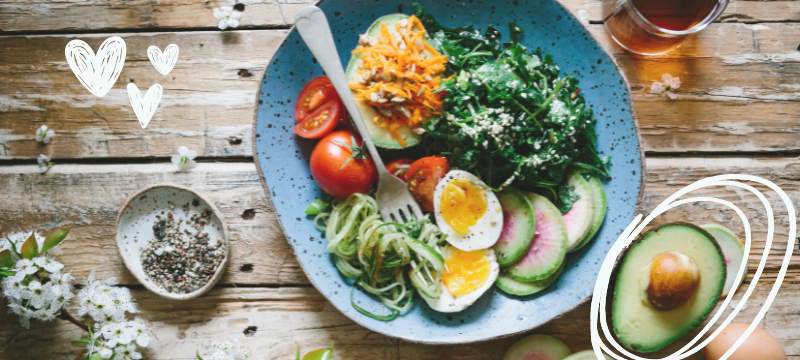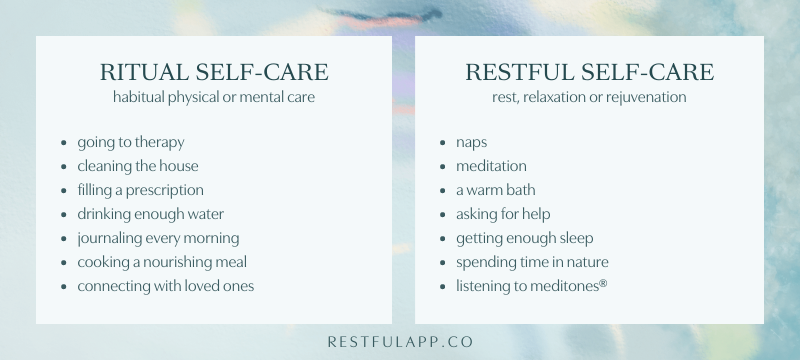Want Consistent Self-Care? You Need to Balance Two Things

Self-care is anything you do intentionally to take care of yourself.

And whilst it seems that the kinds of self-care hashtagged on social media are indulgent, expensive or elaborate, the origins of self-care are much more grassroots.
Self-care is political
As Slate author, Aisha Harris writes about the history of self-care
It wasn’t until the rise of the women’s movement and the civil rights movement that self-care became a political act. Women and people of color viewed controlling their health as a corrective to the failures of a white, patriarchal medical system to properly tend to their needs.
In the 60s, activists, especially women of colour recognised the intersectionality of poverty, racism, sexism and access to healthcare.
The less privilege you have, the less healthcare you can access. And in order to fight the status quo so more people can thrive, you need to stay healthy. Which means you need self-care.
Self-care became an intentionally radical act of self-preservation. A way to demonstrate to an oppressive and often violent society that you matter.
How to practice consistent self-care
In today’s climate, self-care is as vital as ever.
Especially for activists; marginalised, disabled, or neurodivergent people; or anyone with a chronic illness.
So how do you practice consistent self-care, in a way that is sustainable and meaningful without it becoming commodified?
We think it’s about balancing ritual self-care with restful self-care.
How you carry out each one will be completely individual. However, both are required for your own sustenance.
Let’s dive in.
Ritual self-care
Ritual self-care: any habitual physical or mental care required for your survival

Showing up for yourself, especially consistently, is hard work. Meeting your basic needs can be repetitive and dull.
Illustrator and mental health advocate Hannah Daisy calls it “boring self-care”.
But self-care doesn’t mean you have to do by yourself. You may need a carer or people to help you along the way.
There is no shame in needing assistance for self-care.
Ritual self-care could be as simple (not necessarily easy) as:
- making the bed
- filling a prescription
- drinking enough water, or
- journaling every morning
But it could also be things that are more complex, like:
- cleaning the house
- going to therapy
- connecting with loved ones
- cooking a nourishing meal, or
- getting up and dressed
It’s usually the mundane activities that are rarely commemorated but deserve to be celebrated nonetheless.
Why ritual self-care feels hard
Ritual self-care often feels difficult to maintain because it takes relentless effort and usually isn’t very fun.
More often than not, it means doing something boring, uncomfortable or hard in the short term to feel better in the long term.
It means making a commitment to your future self in the here and now.
Ritual self-care is especially difficult if you’re a spoonie, have an invisible or chronic illness, or are recovering from trauma.
When you are fatigued or in pain, ritual self-care may be all you can manage.
But ritual self-care isn’t the only important form of care. You need to balance it with rest.
Restful self-care
Restful self-care: any form of rest, relaxation or rejuvenation

Self-care isn’t all bubble baths and naps. Except when it is. A big part of self-care is rest.
We have internalised capitalistic ideals about hustle and productivity, believing our worth is tied to our output.
We have come to regard self-care as selfish instead of a place to cherish our “soft animal bodies”.
We have participated in the dehumanisation and enslavement of black and brown bodies and then have the audacity to call them lazy.
In a patriarchal, racist, ableist, capitalist society, rest is denied for so many.
Our society has been built (and continues to run) on the backs of slave labour, and unpaid or underpaid labour from women and people of colour.
During the pandemic of 2020, half of all essential workers in the US were Black, Hispanic or Asian American and over 75% of essential health care workers were women.
In Australia, almost 80% of healthcare workers were women, jumping to 95% in aged care.
Despite working in difficult and dangerous conditions, and being considered “essential” to the economy, these workers were also often paid the lowest and had the least access to paid sick leave and health insurance.
Not to mention the unpaid labour, mainly shouldered by women, that increased as children were required to be home-schooled during lockdowns.
In this landscape, restful self-care isn’t a way to offset your productivity. It becomes a politically subversive act, especially for Black and First Nations people.
As Nap Bishop, artist and founder of the Nap Ministry, Tricia Hersey writes:
Rest is a form of resistance because it disrupts and pushes back against capitalism and white supremacy. To imagine a New World that centers liberation, we must practice rest as our foundation to invent, restore, imagine, and build.
Types of restful self-care include:
- naps
- crafting
- meditation
- a warm bath
- daydreaming
- getting enough sleep
- spending time in nature
- listening to meditones®
But they might also include:
- asking for help
- quitting social media
- letting go of toxic relationships
- practicing good boundaries & saying no

An internal barrier to self-care
Whilst a lack of privilege can be a hindrance to care, there is also an internal barrier to overcome in order to make self-care a consistent priority.
Shame.
If you don’t fundamentally believe that you matter and that you are worthy of exquisite care? Then self-care is going to be difficult to sustain.
Whether it’s
- ongoing oppression and trauma,
- feeling ashamed for your care needs, or
- doubts around whether you deserve compassion,
shame can be a deep barrier to self-care.
We also live in an ableist society. One that devalues and pities atypical bodies and brains.
So it’s easy to internalise the idea that needing help, care and assistance are somehow shameful and inferior.
Unpacking ideas about what types of bodies are deemed worthy and why; plus learning to love and accept yourself and your needs will help you sustain the effort required for consistent self-care.
Managing your energy with an energy audit
An energy audit can help you systematise your self-care. It means you’ll spend less mental energy ruminating about it; you’ll be less likely to forget what needs to be done; and have a clear plan of action.
Here are some questions to consider:
- When do I feel most energised throughout the day?
- When do I feel the most tired throughout the day?
- When do I feel most energised throughout the month?
- When do I feel most tired throughout the month?
- What drains my energy?
- What restores it?
- What are my ritual self-care needs?
- What are my restful self-care needs?
- When can I schedule each?
- If I’m having trouble with self-care, who can I ask for help?
- Is there anything about my overall life that needs to change in order to access more care?
- How can I use any existing privilege I hold to help others access more care?
Terms to Remember
Ritual self-care: any habitual physical or mental care required for your survival
Restful self-care: any form of rest, relaxation or rejuvenation
Spoonie: Spoon theory was developed by writer Christine Miserandino to describe to a friend what living with Lupus was like. Spoonie is now a term of identity used by many people living with a chronic illness
Ableism: discrimination and prejudice in favour of able-bodied people
Takeaway
Consistent self-care isn’t easy.
There are many barriers, both external and internal to accessing ongoing care.
But by acknowledging your care needs, asking for help when you need it, and balancing ritual with restful self-care?
You’ll be well on your way to creating and maintaining a consistent self-care routine.
Practice consistent self-care with the Restful app. Download for free on Google Play or the App Store today!